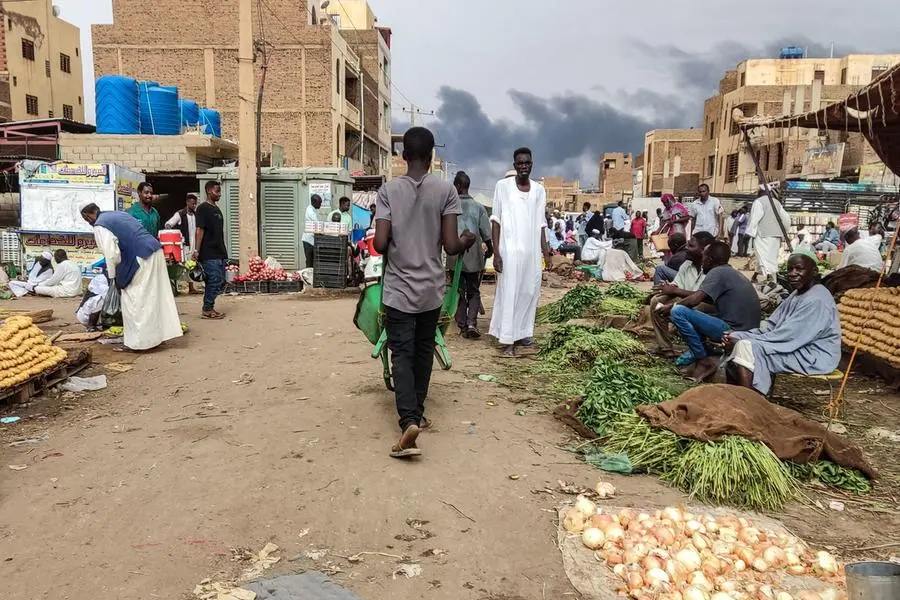PHOTO
More than seven months into Sudan's devastating war that has killed thousands and displaced millions, experts warn that the scarred and impoverished country faces the threat of breaking apart.
The paramilitary Rapid Support Forces (RSF) is waging war against the armed forces and there have been reports of new massacres in Sudan's western Darfur region.
Experts now warn the country could face a "Libya scenario", in reference to the north African country long divided between two rival administrations in its east and west.
"Continued fighting could lead to a few terrifying scenarios, including division," said Khaled Omar Youssef, spokesman for the Forces of Freedom and Change, the main civilian bloc ousted from power in a 2021 joint coup by Sudan's warring generals.
"The rising tide of militarisation along ethnic and regional lines deepens social fissures in Sudan," Youssef told AFP.
As it stands, the RSF is currently in control of much of the capital Khartoum and the Darfur region, while the army controls the country's north and east.
Meanwhile, the army-aligned government has been all but exiled to the eastern city of Port Sudan.
With the two sides failing to make any headway at US- and Saudi-brokered negotiations this month, some fear a new, fragmented status quo.
- Darfur offensive -
Since April 15, the war between army chief Abdel Fattah al-Burhan and his former deputy, RSF commander Mohamed Hamdan Daglo, has forced about six million people to flee both within Sudan and across borders.
By the end of last month, it had killed over 10,000 people, according to a conservative estimate by the Armed Conflict Location & Event Data Project.
But in November, new reports of massacres began to emerge amid a major offensive by the RSF in the vast Darfur region, where they quickly claimed control of army bases in all but one major city.
In Ardamata alone, in West Darfur, the United Nations reported that nearly 100 shelters housing displaced people were razed to the ground, with fighters going house to house killing civilians and more than 8,000 people fleeing to neighbouring Chad in one week.
Preliminary reports indicate hundreds have been killed, but with Darfur under an ongoing communications blackout, civilians have struggled to document the full scale of the violence.
The European Union said on November 12 it was "appalled" by reports of more than 1,000 people killed in "just over two days".
Organisations and civilians have both blamed the RSF and allied Arab militia, which have carried out a targeted campaign against the region's Massalit tribes, including the assassination of tribal leaders.
Across Darfur, home to about a quarter of Sudan's 48 million people, over 1.5 million have been internally displaced since the war began.
- Home turf -
With Burhan and the government having retreated to Port Sudan, fears of division have spiralled.
According to political analyst and journalist Fayez al-Salik, failure to reach a political solution could lead to a situation similar to Libya, with "more than one government, with no real effectiveness or international recognition".
Though Daglo has friends in high places -- including the United Arab Emirates, experts say -- Burhan has maintained his role as de facto head of state on the global stage, recently attending both UN and Arab League summits.
But on the ground, the RSF's unbridled spread through Darfur "gives it home advantage and allows it to move within its own social base", Salik said, referring to the region's Arab tribes.
The RSF's predecessor, the Janjaweed, stemmed from Arab tribal militias armed by former dictator Omar al-Bashir to quash dissent amongst non-Arab minorities.
That war, which began in 2003, killed hundreds of thousands, displaced over two million and saw Bashir indicted for war crimes, crimes against humanity and genocide by the International Criminal Court.
The UN has warned history is repeating itself, and the ICC has launched a fresh investigation.
- No winner -
According to one military expert, even with the RSF offensive, the chances of either side claiming a decisive victory remain slim.
"The RSF's expansion does give it an open line between the capital and Darfur, but that's a very long line," he told AFP, speaking on condition of anonymity out of fear for his safety.
The vast western region is nearly the size of France, "and a lot of it is open areas the army can attack by air", he explained.
But with the RSF now controlling most of Darfur, key oil infrastructure, parts of central Sudan and much of the capital itself, he said an army victory is also unlikely.
"Even if they succeed in taking control of Khartoum, which is very difficult, sending forces to regain areas of Darfur from RSF control would be a massive logistical challenge."
To get from Khartoum to El Geneina, on Sudan's western border, the army would have to fight across over 1,400 kilometres (870 miles) -- about the distance between Berlin and Kyiv.





















